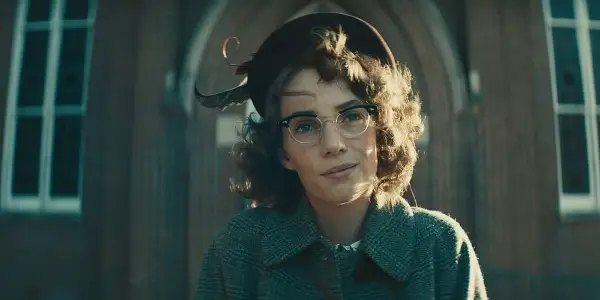WILDCAT: The Hawkes Bring The Prickly Southern Writer To The Screen With Tender Loving Care

Tynan loves nagging all his friends to watch classic movies…
“I am always highly irritated by people who imply that writing fiction is an escape from reality. It is a plunge into reality and it is very shocking to the system.” – Flannery O’Connor
As someone fascinated by story structure, the biopic form is often a tough nut to crack. Cradle-to-grave entries, in covering the breadth of a life, can either feel like rushed simulacrums or stodgy overlong hagiographies nailed to the floor.
The very best movies of this ilk inevitably evoke the spirit of their protagonist with the very skin and bones of their structure. Hence a movie on Yukio Mishima by Paul Schrader that’s wild with heavily striking mise en scene. Or there’s a Brian Wilson story like Love & Mercy that is empathetic, hallucinatory, and musical to the nth degree.
Director Ethan Hawke and his co-writer Shelby Gaines have alighted on a way in which to do service to famed southern Catholic author Flannery O’Connor. Because her life was famously banal – she lived in her Georgia town with her mother, writing alone in her bedroom before her premature death at 39. It’s hardly cinematic. However, they tackle her formative years through the vivid imagination of her own literary works and instantly we have a conceit for the film.
A Singular Voice
It’s important to note while this movie is full of fanciful and often humorous and grotesque portraits of humanity, it never feels like the escapism the author abhorred (One can imagine she would have choice words for the self-aware hothouse melodrama abruptly featured in the opening moments). O’Connor always was concerned with depicting the life she knew by unorthodox and often startling means. There was nothing conventional about it.

A Good Man is Hard to Find is case in point as one of her crowning works where a self-righteous old hag ends up being shot to death by a wanted fugitive. It’s in this precise moment of violent apotheosis that she becomes a person of grace for the first time in her life. In the film, when the gunshot goes off, we watch a young O’Connor (played by the director’s daughter Maya Hawke) go flailing backward from behind her typewriter. She feels her stories so profusely.
We also witness her life during her early career as a young woman. There are stints at the illustrious Iowa Writer’s Workshop under the tutelage of Cal Lowell (Philip Ettinger). She pays a visit to a publisher who tries to tactfully give her feedback on her first novel Wise Blood. She’s quick to retort that she’s “amenable” to criticism but only if it does not attempt to neutralize her artistic vision.
There are sequences of her returning to live with her mother Regina (Laura Linney) in a society where people want her to be the next Margaret Mitchell, penning the next nostalgic Lost Cause classic like Gone With The Wind. Meanwhile, Flannery seems antithetical to the entire idea.
It’s evident she is a singular mind who will not settle when it comes to her writing. She tells the truth as spiny and ugly as it might be. This is my own experience with her work. I rarely enjoy it. I feel scandalized and assailed by it at every turn.
It’s difficult going and then she turns a story around and uses her characters and the bizarre scenarios to ambush me. Ironically, the saving grace of her stories is how they all revolve around the scandal of grace — our need to recognize and accept unmerited favor in our own lives.
The threads of the movie’s narrative are tied together with earnest excerpts from her prayer journal and many of her most notable short stories. One that was my introduction to O’Connor was “Revelation” where a self-righteous white southern lady named Mrs. Turpin gets tackled in a waiting room by an indignant girl named Mary Grace. This comes only after a dream where Jesus comes to Mrs. Turpin and says she can only enter heaven as a black person or white trash. Perish the thought…
The other is “Parker’s Back” where a profligate covered in tattoos marries a devout woman and gets the image of Christ tattooed on his back to please his wife only for her to beat him. He’s tossed out of the house bloody and bruised, brought to the lowest point imaginable. Could this be a blatant breaking of the Hebrew commandment to not make “Graven Images” of God? But then as we watch the picture of Christ being punished in front of us, what are we to do with it? The religious subject matter and the iconography feel uncanny and uncomfortable, a perfect evocation of O’Connor’s sensibilities.

Delving into their conversations, it’s apparent Maya and Ethan Hawke have an abiding appreciation for this woman and her writing. There would be no other reason to make a movie like this with so much tender loving care. And so any mild criticism feels like putting kindred spirits under the chopping block. It need not be so. They feel like dear friends.
John Huston‘s adaptation of Wise Blood has an intuitive handle on the Southern milieu and the absurd humor found in O’Connor‘s work. She’s darkly funny. It seems to thrive while still getting to the perplexing themes at the core of a story that feels shocking as she tears through the Southern mentality with her incisive quill.
The Tough Questions
What Wildcat has is something so often absent from both film and art these days. It’s not squeamish about the tough conversations nor does it skirt over the most prickly issues, not only of America’s legacy but the very essence of the human experience.
There’s a weight and a gravity to it that’s felt in almost every frame. The only reprieves come from O’Connor‘s own wit. This is all in service to its subject because Flannery was a young woman sincerely struggling to balance her aspirations to be a writer of consequence and also a devout person of faith in communion with a higher power.
It’s easy to be moved when Flannery sits among her cohort at the writer’s workshop in Iowa — a midwestern institution that nevertheless maintains a reputation for the literati — and she says religion is not an electric blanket; it’s not easy, but it was necessary for her.
It’s so difficult to take stories that live in our mind’s eye and bring them to the screen because then they are concrete. Endless possibilities of imagination are distilled down to distinct creative choices. Hawke’s film tailors its palette to a tempest-like existence that roils O’Connor‘s soul as she seems to battle for life and death with her typewriter as her only weapon.

Is this a bit much? Perhaps and yet anyone who does write and cares about art or has suffered, recognizes that it doesn’t feel like hyperbole. It feels real and affecting — like something we understand intimately. In O’Connor, we see reflections of our struggles in our own creative endeavors. Because we believe our words mean something and that life matters and questions of death, faith, and imagination are not ancillary topics for dinner parties. They are the crux of our entire existence.
Cal, Flannery’s pen pal and hinted love interest, gives her a volume of Thomas Merton, and in this reference and watching her tumultuous struggle depicted on film, it’s hard not to draw lines between Maya Hawke‘s performance and her father’s protagonist in First Reformed (Ettinger also had a crucial role in that film).
For that matter, one of the other integral scenes involves a priest played by Liam Neeson. It feels almost like an act of reclamation after his apostasy in Martin Scorsese’s Silence. He pays Flannery a visit as she’s bedridden, stricken with the lupus that killed her father, and currently unable to write. Here he enters in to provide Flannery comfort and in all her internal turmoil, he reminds her of grace and grace abundant. There is immense power in this even in its simplicity.
Because the storm outside her bedroom window or even the lupus that’s ravaging her body almost feel like outward manifestations of the real struggle going on. Why does hardship often make us more aware of grace and our need for it in our lives, whether we want to accept it or not? Pain is not easy. Happy, warm, affable stories are a lot more palatable. Regina asks her daughter in one scene why she can’t write stories a lot of people like, which is a euphemism for light, cotton candy pap.
O’Connor would never dare be so disingenuous about her faith or her storytelling. Judging from her life and premature death, she was more than acquainted with troubles. She had an intimate relationship with them. Certainly, this was not the life she had envisioned for herself. Regardless, she ran the race of life even if it was on crutches. Perhaps not dissimilar to a hapless chicken walking backward. What’s more, she blessed all of us with her stories — signposts to help us along our own paths — shocking us back to reality.
Conclusion: Wildcat
I couldn’t get the image out of my head — first as Flannery picks up her new peacock from the train station and then the remarkable moment where its tail feathers fan out behind her in a glorious display. If other people saw her as that measly chicken, in her own eyes or the eyes of the Creator she believed in perhaps she really was that glorious peacock.
Once you see the film’s world as being bathed in the blues and greens of the peacock’s plumage, you cannot unsee it. They become a lens through which to see beauty and empathize with one of our great American writers. What a gift it is.
Wildcat was initially given a limited release in the U.S. on May 3rd, 2024.
Does content like this matter to you?
Become a Member and support film journalism. Unlock access to all of Film Inquiry`s great articles. Join a community of like-minded readers who are passionate about cinema - get access to our private members Network, give back to independent filmmakers, and more.
Tynan loves nagging all his friends to watch classic movies with him. Follow his frequent musings at Film Inquiry and on his blog 4 Star Films. Soli Deo Gloria.












